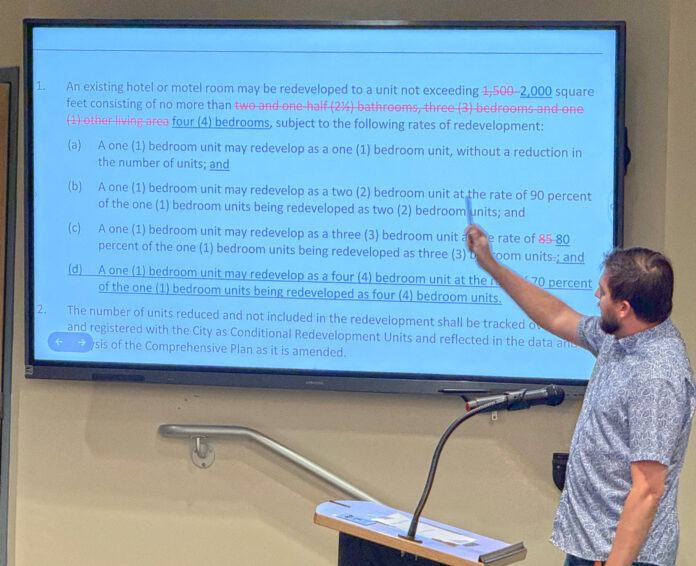
A full house of public commenters with a nearly-unanimous voice against expanded resort development saw their efforts rewarded at the Marathon City Council’s Feb. 27 workshop, as the council made preliminary moves to scale back its proposed hotel/motel redevelopment ordinance.
Ordinance 2023-15, which would modify the parameters for redeveloping single-bedroom transient units in hotels and motels as multi-bedroom units, has been under a microscope since its original review by the council in August 2023. The version presented at the start of Tuesday night contained provisions for increased affordable housing requirements and guidelines for redeveloping single-bedroom units as units up to 2,000 square feet with up to four bedrooms.
The version of the proposed ordinance attached to Tuesday’s agenda, however, made no mention of a former proposed revision that would have allowed for redevelopment of units with five or six bedrooms, but only on land zoned for parks and recreation.
That provision came under heavy fire in January and early February from councilman Kenny Matlock, who levied accusations against City Manager George Garrett and said he believed the changes were made explicitly to aid the development of the upcoming Florida Keys Resort on Sombrero Boulevard – the only privately-owned property in Marathon with transient unit rights on parks and recreation-zoned land.
The former proposed revision was the elephant in the room on Tuesday night, as public commenters spoke overwhelmingly in favor of restoring the eastern nine holes of the Florida Keys Country Club golf course and protecting the course against resort expansion.
As ordinance language affecting only that property was removed from the version considered Tuesday night, public commenters were repeatedly asked by Mayor Robyn Still to constrain their remarks to the current ordinance, prompting pushback from Matlock and several speakers.
Several commenters cautioned more generally against revisions that would allow for increased development in Marathon as one-bedroom units change to multi-bedroom suites with a limited reduction in the overall number of units.
“The way this ordinance is structured, it seems to be just a way to get around the growth ordinances from the state due to overcrowding and hurricane evacuation,” said resident Phil Desfosses, whose comments were met with applause from the public. “When you expand the number of (bedrooms) and the number of people by three or four times, but only reduce the number of units by 20%, it shouldn’t be a way around that growth.”
With some speakers requesting that the golf course be added to a future council agenda for formal discussion, councilmen Jeff Smith and Luis Gonzalez, along with City Attorney Steve Williams, reminded those in attendance that the course is privately owned, not managed by the city. The development agreement for the Florida Keys resort, in place since 2014, includes plans to complete the property’s 18-hole golf course along with 15 three-bedroom units, and any modifications to that plan would require multiple public meetings and council approval as well as approval at the state level, they said.
Smith supported the potential for the larger multi-bedroom resort units to draw guests away from vacation rental units in residential neighborhoods, concentrating them in commercially-zoned areas.
“My concern is how to limit vacation rentals,” Smith said. “This is another opportunity to perhaps help stem the conversion of our residential housing stock. … Allowing (this) in a commercially-zoned area of a hotel/motel, where they have more flexibility with their capital, may actually disincentivize the use of a residential property for a commercial purpose.”
“I feel like we’re supporting essentially a 24-hour turnaround house,” said Matlock. “There is nothing I have heard that’s positive for this community to increase that square footage and bedroom count.
“My question goes back to, what do we gain in doing this? … Given the current situation in town with overdevelopment, I think we should reduce it.”
Though the council could not make any formal vote at its workshop meeting, city staff were instructed by general consensus to make the following changes to the ordinance for review and potential approval at a future council meeting:
- Hotels and motels must provide on- or off-site employee housing living space in an amount equal to 25% of the approved floor area in guest units. The previous requirement was 20%.
- All hotels and motels must provide a lobby for guests to check in and out.
- Redeveloped units may not exceed 1,500 total square feet with three bedrooms, two and a half bathrooms and one additional living area. Prior proposed versions of the ordinance included a 2,000-square-foot cap or removal of a square foot limitation, as well as provisions for four- to six-bedroom redeveloped units.
- A one-bedroom unit may redevelop as a two-bedroom unit in exchange for a 10% reduction in the overall number of units, or as a three-bedroom unit in exchange for a 20% reduction.
The four council members in attendance, with Vice Mayor Lynn Landry absent, universally praised the resident turnout at the meeting in their comments, hailing the session as one of the best-attended workshops so far and urging attendees to continue submitting topics of interest for future sessions.

























